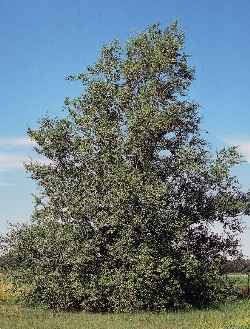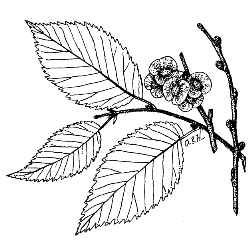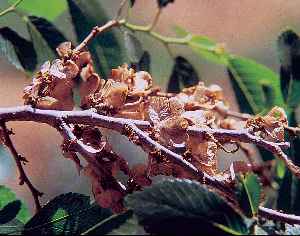
"Ulmus pumila", Herman, D.E. et al. 1996. North Dakota tree handbook. USDA NRCS ND State Soil Conservation Committee;
Sunset®: 1-24,26-345
USDA: 2-9
Sun Exposure: Full sun to part sun
Origin: Central Siberia, north China
Growth Habits: Deciduous tree, moderate to rapid growth to 30 to 70 feet tall (9-21 m), 25 to 40 feet spread (7.5-12 m), irregular shape due to limb breakage; irregularly furrowed bark; elliptic dar green leaves, 1 to 2.5 inches long (2.5-6.2 cm), turning yellow in the fall
Flowers: Red flowers
Watering Needs: Regular water, more drought resistant than the Chinese elm
Propagation: Seeds, self sows, can be invasive
Propagation: Cutting or occasionally seed
- by semi-hardwood stem tip cuttings, in summer. Use intermittent mist. Root in 8 weeks.
- by seeds.

"Ulmus pumila", U.S.D.A Forest Service, Courtesy of the Hunt Institute
Invasive tree, it is considered a noxious weed in several states. In the garden, its only redeeming values are extreme resistance to environment, and fast growth. In general it is not a great choice.

Herman, D.E. et al. 1996. North Dakota tree handbook. USDA NRCS ND State Soil Conservation Committee;
Blooming Habits:
Inconspicuous pale green flowers, in clusters, in the spring, before the leaves.
Fruiting Habits:
Flat, papery, winged samaras in mid-spring, nearly round, 0.5 inch in diameter (12 mm) with a notch at the tip.
Desert-Tropicals is dedicated to provide gardening advice, gardening ideas, and information about flower of all kind for landscape and collections.We try to check carefully the identification of the plants on the illustrations as well as the other information from the page, but occasionally errors do occur. if you notice anything that needs to be changed please contact us.Thanks.
© 1998-2020 Philippe Faucon, All Rights Reserved.